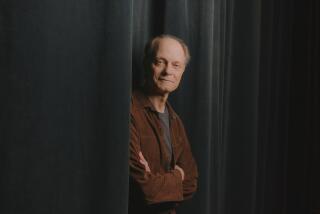A Cheated Maid, a Once Love-Sick Boy
- Share via
It was on a recent trip to the J.P. Morgan Library in Manhattan that I first learned of “Trial by Jury.” On display amid the library’s formidable collection of manuscripts was the original libretto of this Gilbert and Sullivan opera, written in 1875 and first performed at the Royal Academy Theater in London. Fortunately for me, a (somewhat) less expensive version of the text was available for purchase at the museum shop.
The humorous opera, or operetta, really--its lyrics fill a mere 13 pages--tells the story of Edwin, a man on trial for breach of promise to marry. The plaintiff is his jilted lover, Angelina, “the broken flower.”
It fast becomes apparent, however, that this “cheated maid” is no fool. She has done what any smart woman would do under the circumstances: find herself a lawyer--a lawyer who is able, with meticulous rhythm and rhyme, to succinctly state his client’s case against the monstrous Edwin: “See my interesting client/ Victim of a heartless wile!/ See the traitor all defiant/ Wear a supercilious smile!”
Worse treachery than Edwin’s, as described by Angelina’s counsel, is difficult to imagine: “Picture, then, my client naming/ And insisting on the day/ Picture him excuses framing / Going from her far away:/ Doubly criminal to do so,/ For the maid had bought her trousseau!”
How could it happen? Why can Edwin no longer, as he himself claims to have once done, “mope, and sigh, and pant,/ Just like a lovesick boy” for poor Angelina? Oh, the usual. And expressed by Edwin, mind you, without a trace of contrition: “But joy incessant palls the sense; / And love, unchanged, will cloy, / And she became a bore intense/ Unto her lovesick boy!/ With fitful glimmer burnt my flare/ And I grew cold and coy, / At last one morning I became/ Another’s lovesick boy.”
Remorse? Regrets? You’ll find none of that in this defendant. To the contrary, Edwin is downright alarmed that his behavior has landed him in a court of law. In his view, his dalliance with two women is but an example of behavior that ordinarily attracts hardly a second look, much less the scrutiny of a tribunal: “Consider the moral, I pray/ Nor bring a young fellow to sorrow,/ Who loves this young lady today, / And loves that young lady tomorrow. . . . You cannot eat breakfast all day,/ Nor is it the act of a sinner/ When breakfast is taken away/ To turn your attention to dinner.”
Most fortunately for Edwin, the judge is on a tight schedule, not to mention recently divorced. In the interests of efficiency and lechery, the judge cleverly solves the “nice dilemma” before the court by marrying Angelina himself, and Edwin goes scot-free. Boy, if life were only like this!
From its first performance, “Trial by Jury” was a hit, earning high praise from the Daily Telegraph, Punch and other newspapers of the day. Nor have the 124 years since its debut diminished its popularity. To the contrary, it continues to find a healthy supply of enthusiastic audiences, some composed of the most discriminating listeners in the nation.
Only a few months ago, a selection of songs from “Trial by Jury” was performed for the justices, their families and honored guests at a reception in the U.S. Supreme Court. One can’t help but think that the lyrics resonated with particular clarity for one possible audience member--Chief Justice William Rehnquist--as he girded himself for special detail across the Mall.
For the character of Edwin in “Trial by Jury,” of course, brings to mind another fellow recently tried for his reluctance to choose between the various women who cross his path. Might Gilbert and Sullivan’s text lend perspective on our president’s current state of (forgive me) affairs?
After all, the parallels are remarkable. In a New York Times article, Bill Clinton was described as someone who “has always been a man who wants all things, all the time,” and provides the following anecdote in support: “At a White House lunch with the network news anchors early in his first term, guests were offered a choice of chicken, fish or meat, and the president had a bit of each.” Why choose when one can have it all?
Certainly Edwin would be the first to agree. In his mind as well, and as he tells the jury, romantic duplicity is no more censurable than a tasting menu: “And it’s not in the range of belief/ That you could hold him a glutton,/ Who, when he is tired of beef,/ Determines to tackle the mutton.”
If “Trial by Jury” can offer no clarification of the Clinton conundrum, it may provide something equally valuable: perspective. The operetta treats its subject matter with whim, humor and, above all, dispatch. Performed in its entirety, it is less than 40 minutes long. Perhaps the proper duration of a trial of this nature.
More to Read
The biggest entertainment stories
Get our big stories about Hollywood, film, television, music, arts, culture and more right in your inbox as soon as they publish.
You may occasionally receive promotional content from the Los Angeles Times.










